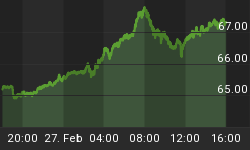The following is part of Pivotal Events that was published for our subscribers September 3, 2015.
Signs of The Times
"U.S. Farm Incomes Cut By Half As Low Grain Prices Bite"
- Financial Times, August 25.
"5 Reasons a 2009-Style Real Estate Meltdown Is Unlikely Now"
- Market Watch, August 25.
"Margin Calls Bite Investors, Banks"
- Wall Street Journal, August 26.
"Even Goldman Sachs hasn't been left unscathed by the carnage."
- Bloomberg, August 27.
"The US mutual fund industry's most famous emerging markets specialists have suffered an August Horribilis, as wild currency swings wiped billions of dollars off the value of their funds."
- Financial Times, August 28.
"The slide in the Shanghai composite has brought valuations down to a 'normal' level."
- Capital Economics, September 1.
But in all the turmoil, the BoJ is still focused on trying to get the rate of CPI inflation up.
"The Bank of Japan can achieve its 2% inflation target with the current level of monetary stimulus."
- Bloomberg, August 26.
Perspective
Will the "August Horribilis" turn into an Annus Horribilis?
In which case, the Annus Mirabilis would be over.
The above observation that stocks are down to better valuations is typical of the initial collapse in speculation. Usually made by those who are surprised by the move.
Perhaps the most important part of the setback is that it is global. This should condemn the notion of a national economy forever. Of course interventionist economics was founded on this specious concept. Then there are the widely-publicized efforts by Chinese authorities to prevent the natural collapse of speculation.
The transition from the Great Complacency has been a severe shock to the financial and economic establishment. Is it enough to have cleared the problems consequent to excessive speculation?
Stock Markets
On "Black Monday" (August 24), the plunge in the S&P drove the Daily RSI down to the lowest reading since late August 2011. The eventual low was set in that October. That was a seasonal correction in the cyclical bull market.
Quite likely, the June blow-out in Shanghai completed a fabulous bubble. In which case a cyclical global credit contraction would follow. So far the ups and downs in the SSEC are following the pattern that followed the blow-outs of gold in 1980 or the Nikkei in 1989, for example.
The 45 percent drop in the SSEC in 2 1/2 months compares to the 48 percent drop in the NY market in two months in the fall of 1929.
It is uncertain how tightly the ups and downs will follow the pattern but all of the excesses built up in any bubble eventually get fully washed out. These have happened in unplanned economies in 1825 and in 1873, mixed economies in 1929 as well as in unconstrained mercantilism in 2007. It seems that classic crashes can occur in Communist financial bubbles as well.
No ideology is proof against booms and busts.
Last week, we thought that with the oversold, just the Jackson Hole event itself would prompt a relief rally. Whatever was said would have little actual influence on financial history. Relief could run for a week or so. This could be the appropriate setup for seasonal pressures later in the year.
Of technical interest, the two rebound rallies on the S&P were curbed by the Keltner Channel which is declining. The low was 1867, the first high was 1993 and the low was 1903. At 1975 now it could roll over. Clearly, taking out 1903 would be a strong alert to more pressures.
Sector Review:
Canada's largest bank (RY) reached its best with the "rotation" in commodities in May. The high was C$80 and the low on the bad day was 68. Now at 72.
The high for US Banks (BKX) was 80.87 in July and the low was 67.80. It is now at 70. For Broker Dealers (XBD) the high was 203 in July and the low was 162. It is now at 173.
IBB plunged from 400 to 284 and is back to 349.
The numbers for TSLA are 286, 195 and 252. For DIS, they are 120, 90 and 102.
Base metal miners (SPTMN) fell from 832 in May to 393 and its back to 449.
Altogether this amounts to serious damage to global equity markets.
This week's list of headlines includes one about better valuations now available in China. In the fateful summer of 1873 a New York newspaper editorialized that nothing could go wrong. The US did not have a mere central bank. It had the highly-regarded Treasury System which could issue any amount of liquidity by buying bonds. In October the same paper observed that stocks were now more attractively priced.
That contraction started with the crash in 1873 and lasted until the recession low of 1895. In 1884 senior economists in England began calling it the Great Depression.
Link to September 4, 2015 Bob Hoye interview on TalkDigitalNetwork.com: http://talkdigitalnetwork.com/2015/09/central-bankers-powerless-to-stop-market-decline/
Listen to the Bob Hoye Podcast every Friday afternoon at TalkDigitalNetwork.com















